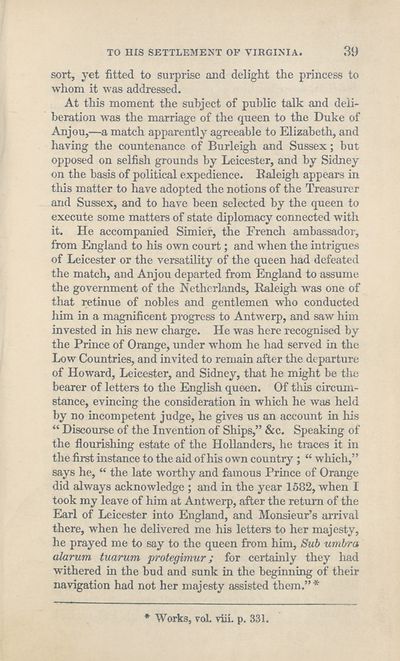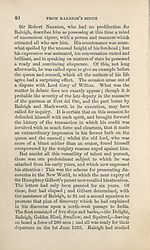Download files
Complete book:
Individual page:
Thumbnail gallery: Grid view | List view

TO HIS SETTLEMENT OF VIRGINIA. 39
sort, yet fitted to surprise and delight the princess to
whom it was addressed.
At this moment the subject of public talk and deli¬
beration was the marriage of the queen to the Duke of
Anjou,—a match apparently agreeable to Elizabeth, and
having the countenance of Burleigh and Sussex; but
opposed on selfish grounds by Leicester, and by Sidney
on the basis of political expedience. Raleigh appears in
this matter to have adopted the notions of the Treasurer
and Sussex, and to have been selected by the queen to
execute some matters of state diplomacy connected with
it. He accompanied Simier, the French ambassador,
from England to his own court; and when the intrigues
of Leicester or the versatility of the queen had defeated
the match, and Anjou departed from England to assume
the government of the Netherlands, Raleigh was one of
that retinue of nobles and gentlemen who conducted
him in a magnificent progress to Antwerp, and saw him
invested in his new charge. He was here recognised by
the Prince of Orange, under whom he had served in the
Low Countries, and invited to remain after the departure
of Howard, Leicester, and Sidney, that he might be the
bearer of letters to the English queen. Of this circum¬
stance, evincing the consideration in which he was held
by no incompetent judge, he gives us an account in his
“ Discourse of the Invention of Ships,” &c. Speaking of
the flourishing estate of the Hollanders, he traces it in
the first instance to the aid of his own country ; “ which,”
says he, “ the late worthy and famous Prince of Orange
did always acknowledge ; and in the year 1582, when I
took my leave of him at Antwerp, after the return of the
Earl of Leicester into England, and Monsieur’s arrival
there, when he delivered me his letters to her majesty,
he prayed me to say to the queen from him, Sub umbra
alarum tuarum protegimur; for certainly they had
withered in the bud and sunk in the beginning of their
navigation had not her majesty assisted them.” *
* Works, vol. viii. p. 331.
sort, yet fitted to surprise and delight the princess to
whom it was addressed.
At this moment the subject of public talk and deli¬
beration was the marriage of the queen to the Duke of
Anjou,—a match apparently agreeable to Elizabeth, and
having the countenance of Burleigh and Sussex; but
opposed on selfish grounds by Leicester, and by Sidney
on the basis of political expedience. Raleigh appears in
this matter to have adopted the notions of the Treasurer
and Sussex, and to have been selected by the queen to
execute some matters of state diplomacy connected with
it. He accompanied Simier, the French ambassador,
from England to his own court; and when the intrigues
of Leicester or the versatility of the queen had defeated
the match, and Anjou departed from England to assume
the government of the Netherlands, Raleigh was one of
that retinue of nobles and gentlemen who conducted
him in a magnificent progress to Antwerp, and saw him
invested in his new charge. He was here recognised by
the Prince of Orange, under whom he had served in the
Low Countries, and invited to remain after the departure
of Howard, Leicester, and Sidney, that he might be the
bearer of letters to the English queen. Of this circum¬
stance, evincing the consideration in which he was held
by no incompetent judge, he gives us an account in his
“ Discourse of the Invention of Ships,” &c. Speaking of
the flourishing estate of the Hollanders, he traces it in
the first instance to the aid of his own country ; “ which,”
says he, “ the late worthy and famous Prince of Orange
did always acknowledge ; and in the year 1582, when I
took my leave of him at Antwerp, after the return of the
Earl of Leicester into England, and Monsieur’s arrival
there, when he delivered me his letters to her majesty,
he prayed me to say to the queen from him, Sub umbra
alarum tuarum protegimur; for certainly they had
withered in the bud and sunk in the beginning of their
navigation had not her majesty assisted them.” *
* Works, vol. viii. p. 331.
Set display mode to:
![]() Universal Viewer |
Universal Viewer | ![]() Mirador |
Large image | Transcription
Mirador |
Large image | Transcription
| Antiquarian books of Scotland > Politics & government > Life of Sir Walter Raleigh > (45) |
|---|
| Permanent URL | https://digital.nls.uk/113652944 |
|---|
| Description | Thousands of printed books from the Antiquarian Books of Scotland collection which dates from 1641 to the 1980s. The collection consists of 14,800 books which were published in Scotland or have a Scottish connection, e.g. through the author, printer or owner. Subjects covered include sport, education, diseases, adventure, occupations, Jacobites, politics and religion. Among the 29 languages represented are English, Gaelic, Italian, French, Russian and Swedish. |
|---|

